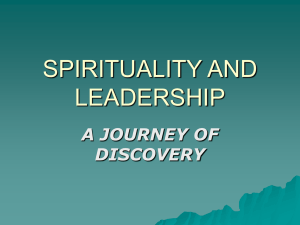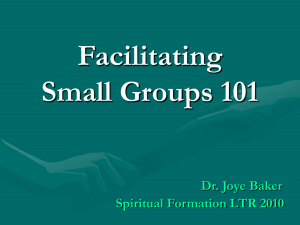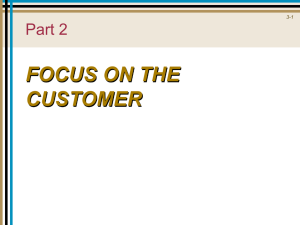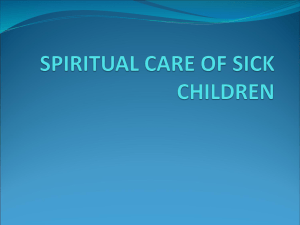my PowerPoint presentation to the doctoral
advertisement
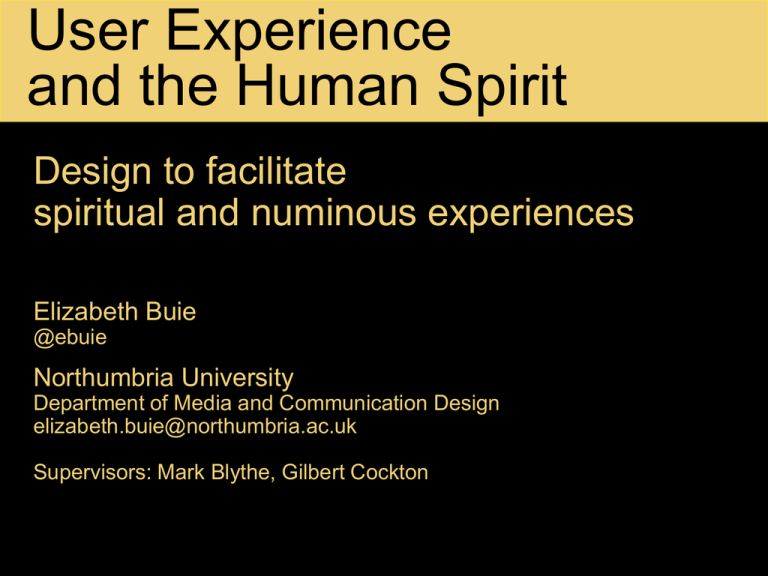
User Experience and the Human Spirit Design to facilitate spiritual and numinous experiences Elizabeth Buie @ebuie Northumbria University Department of Media and Communication Design elizabeth.buie@northumbria.ac.uk Supervisors: Mark Blythe, Gilbert Cockton Background Master’s degrees in Mathematics (NC State) and Human Development (Maryland) In CHI for many years as a practitioner Consultant in interaction design, usability and UX, mostly in government systems Background Master’s degrees in Mathematics and Human Development In CHI for many years as a practitioner Consultant in interaction design, usability and UX, mostly in government systems Co-editor of book on UX in government Eton Choirbook score Donaldson score Beltway Collegium Cantorum “Spiritual experience” An experience in which one feels a deep connection with something larger than oneself (Seligman’s view, part of “meaning making” in his PERMA framework of well-being) “Something” could be a deity or something else: the bounty of nature the grandeur of the universe the compassion of a humanitarian cause the richness of a research programme Research Questions 1. What characterizes techno-spiritual experiences and supporting technologies? 2. Can technology be designed to facilitate such experiences without being tied to a specific faith tradition? 3. What value might such ICTs have beyond experience & spirituality per se? (e.g., creativity, well-being) The answers should inform the design of techno-spiritual ICT Research Goal 1 & Methods Explore qualities of techno-spiritual experiences & ICTs: 1. Review literature about historical use of means such as architecture & music to evoke spiritual experiences 2. Analyse purposes and qualities of a variety of existing techno-spiritual ICTs 3. Interview people from a wide variety of spiritual perspectives to elicit descriptions of spiritual experiences that they have had 4. Analyse descriptions from the interview data using a grounded theory approach Research Goal 1: Progress (1) 1. Review literature about use of means such as architecture & music to evoke spiritual experiences: 1. Literature on the nature of spirituality and spiritual experience turned out to be much richer 2. Most from healthcare and psychology/psychiatry/neuroscience 3. Spirituality: spirituality vs. religion, assessing spirituality 4. Spiritual experience: phenomenology, triggers, common characteristics 5. Nature of awe, wonder, numinosity Research Goal 1: Progress (2) 2. Analyse purposes and qualities of a variety of existing techno-spiritual ICTs: 1. Inventory of iTunes App Store (and comparison with coverage of ACM-DL; alt.chi 2013) Research Goal 1: Progress (2) 2. Analyse purposes and qualities of a variety of existing techno-spiritual ICTs: 1.Inventory of iTunes App Store (and comparison with coverage of ACM-DL; alt.chi 2013) 2.Analysis of viewer comments on top-viewed YouTube videos for meditation (and some features of videos; presented at DPPI 2013) 3.A recent (April 2014) search of YouTube for “meditation” found 9.4 million videos Research Goal 1: Progress (3&4) 3. Interview people from a wide variety of spiritual perspectives to elicit descriptions of spiritual experiences that they have had: 1. Began pilot interviews to obtain data on spiritual and religious backgrounds and experiences 2. Have conducted four pilot interviews so far 4. Analyse interview data (not started) I would like to discuss some considerations regarding techniques for data collection and approaches to analysis, design, and evaluation. Research Goal 2 Develop a conceptual framework that relates the qualities of techno-spiritual experiences and ICTs. 1.Analyze the qualities of the ICTs that supported and facilitated the interviewees’ experiences, and add them to the qualities found by Goal 1 2.Identify and analyze relationships between the qualities of techno-spiritual experiences and those of ICTs that facilitate them, and document them in a conceptual framework (not started) Research Goal 3 Explore in more depth the design space of techno-spiritual experiences. 1. Follow the qualitative study with research through design. Develop a prototype and explore the space of techno-spirituality in more depth with participants 2. Refine and revise the design as appropriate, to incorporate findings from evaluative studies Refine the conceptual framework as appropriate (not started) 3. I would like to discuss some considerations regarding techniques for data collection and approaches to Explorations Imaginary abstracts: “a summary of a paper that has not been written about a prototype that does not exist” (Mark Blythe, CHI 2014 paper) Science fiction and its treatment of techno-spirituality Contribution to Knowledge Greater knowledge of how people are using technology to enhance their spiritual lives A better understanding of the relationship of design to the quality and qualities of techno-spiritual experiences Potential value of techno-spiritual design to other aspects of life Thank you Elizabeth Buie Northumbria University Newcastle upon Tyne, UK elizabeth.buie@northumbria.ac.uk @ebuie uxandhumanspirit.wordpress.com (research) leisurelyseekingdoctorate.wordpress.com (blog)



